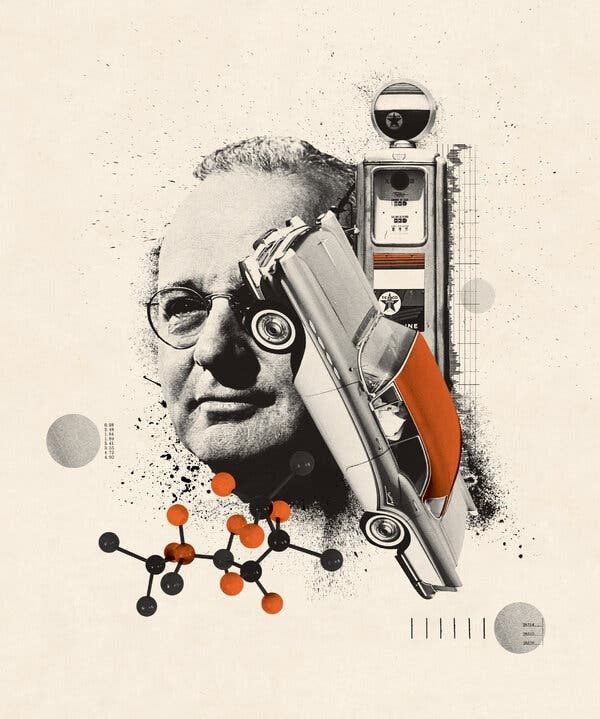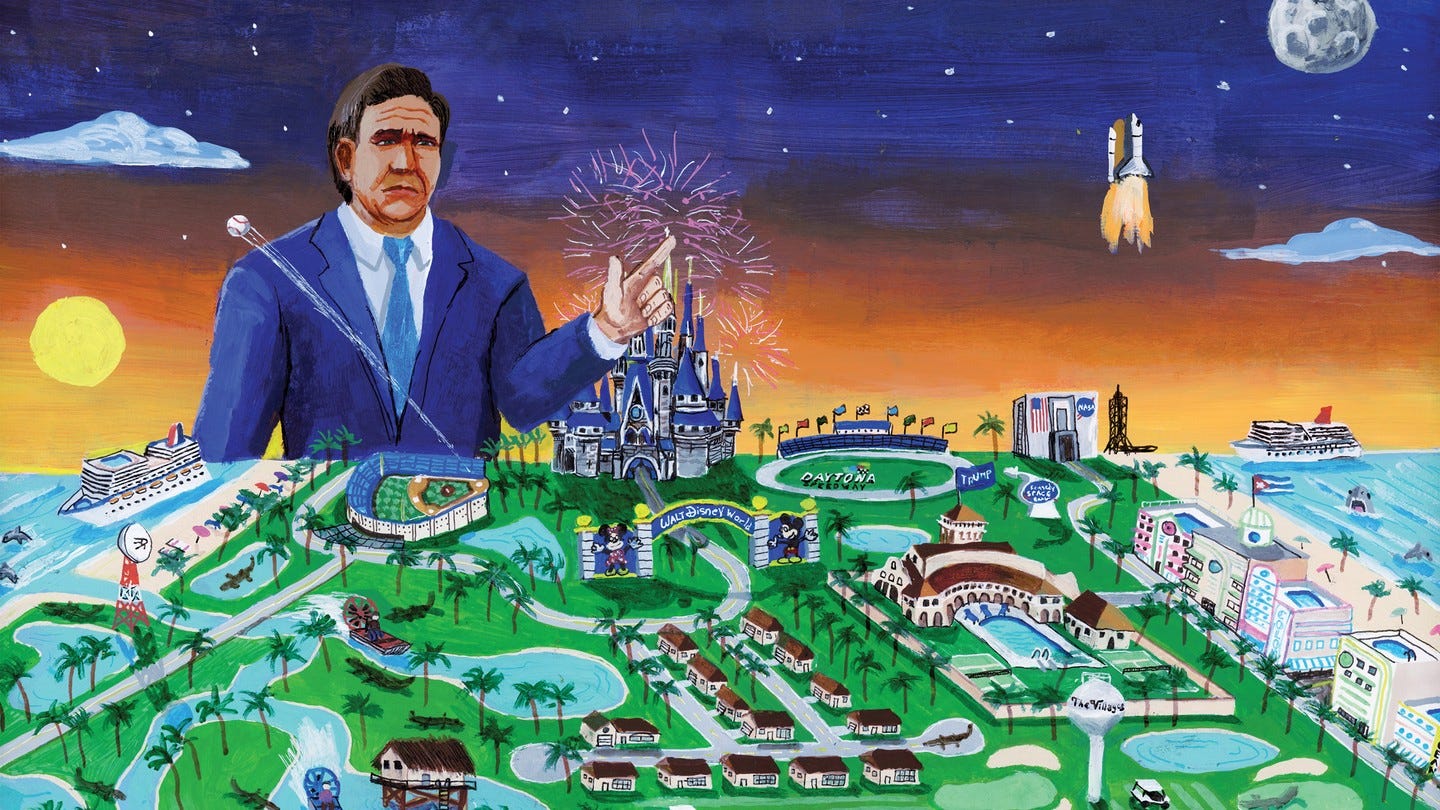Happy Friday!
The final episode of The Spark is now online: Rochelle Burgess of UCL on social prescribing, ie non-medical interventions to promote health, such as joining a gardening club or choir. Hope you enjoy.
Helen
The Man Who Broke The World (New York Times)
In the fall of 1940, at age 51, [Thomas] Midgley contracted polio, and the dashing, charismatic inventor soon found himself in a wheelchair, paralyzed from the waist down. At first he took on his disability with the same ingenuity that he applied to maintaining his legendary lawn, analyzing the problem and devising a novel solution to it — in this case, a mechanized harness with pulleys attached to his bed, allowing him to clamber into his wheelchair each morning without assistance. At the time, the contraption seemed emblematic of everything Midgley had stood for in his career as an inventor: determined, innovative thinking that took on a seemingly intractable challenge and somehow found a way around it.
Or at least it seemed like that until the morning of Nov. 2, 1944, when Midgley was found dead in his bedroom. The public was told he had been accidentally strangled to death by his own invention. Privately, his death was ruled a suicide. Either way, the machine he designed had become the instrument of his death.
Steven Johnson is such a stylish writer; here he is on the best-worst inventor in history, the guy responsible for CFCs and leaded petrol.
The piece poses a larger question about the ethics of market-driven innovation, and solving problems in the now by creating problems for the future: “The rise of Ethyl [leaded petrol] was an old story: a private company’s reaping profits from a new innovation while socializing the costs of its unintended consequences and overriding the objections at the time through sheer commercial might.” It also notes that the big problems with CFCs was the potential for uncontrollable chain reactions, and that many of the frontiers of science today concern technologies—AI, CRISPR-edited organisms, nanobots, genetically-engineered viruses—with the potential to replicate themselves. Cheery stuff.
Also, if you’re ever tempted to complain about ‘elf and safety, read this about the lead manufacturing plant which poisoned all its workers: ‘Before work was halted at the plant, the hallucinations of swarming insects became so widespread that the five-story building where Ethyl was produced was called the “house of butterflies.”’
Ron DeSantis’s Magic Kingdom
In case you missed it on Monday, my new Atlantic longread is out, on Florida.
Quick Links
Ill-advised duets of our time: Pavarotti and Boyzone (twitter).
“Deliberate attempts to create barriers to accessing services are known as ‘ordeals’. An example would be the decision to prevent anyone seeking asylum from working, so forcing them to live on a pittance, in the hope that it will put people off attempting to come to the UK, even though doing so adds considerable cost to the state. The welfare system is full of ordeals, whether in the form of complex assessments needed to access services, or the threat of sanctions, for those receiving benefits, if various conditions aren’t met.” Sam Freeman on deliberate inefficiencies in British welfare policy (Comment is Freed).
BuzzFeed is publishing AI-written travel guides, which call everything a “hidden gem.” (Futurism)
‘My daughter is 17. She lives her life largely in opposition to the work her parents have spent their lives dedicated to, where she’ll say things like, “I’m not sure film is really … Do you think it’s a genuine art form?”’ Ben Affleck seems very smart. No wonder he started drinking to get through Hollywood parties. This interview is very interesting on the economics of the current movie business (Hollywood Reporter).
“Russell Brand was there. He denies that now. Which is funny because he’s done some dodgy things in his career and auditioning for Five isn’t the worst thing he’s done.” A 90s pop retrospective (Guardian).
‘Every five or six minutes, someone in the social sciences publishes a PDF with a title like “Humans 95 Percent Happier in Small Towns, Waving at Neighbors and Eating Sandwiches.” When we gather in groups of more than, say, eight, it’s a disaster. Yet there is something fundamental in our nature that desperately wants to get everyone together in one big room, to “solve it”.’ Paul Ford on Twitter as the Tower of Babel (Wired).
‘“It’s all about identity,” [Alberto] Grandi tells me between mouthfuls of osso buco bottoncini. He is a devotee of Eric Hobsbawm, the British Marxist historian who wrote about what he called the invention of tradition. “When a community finds itself deprived of its sense of identity, because of whatever historical shock or fracture with its past, it invents traditions to act as founding myths,” Grandi says. . . . Panettone is a case in point. Before the 20th century, panettone was a thin, hard flatbread filled with a handful of raisins. It was only eaten by the poor and had no links to Christmas. Panettone as we know it today is an industrial invention.’ SO-CALLED ITALIAN FOOD IS A LIE (Financial Times).
Bizet performed with liquor bottles (Twitter).
“We don’t have safe spaces for kids so they won’t be offended by a Halloween costume. . . . We don’t have any problem showing David. You have to tell the parents ahead of time, and they can decide whether it is appropriate for their child to see it.” Highly enjoyable interview with an American school governor who is against trigger warnings (for snowflake libs) but apparently doesn’t realise he wants one himself, for kids in an art class seeing Michelangelo’s David (Slate).
“In Vermeer’s Family Secrets, Binstock did not merely go against the grain of conventional wisdom. He saw himself as an apostate, a heretic rising up from the very heart of the profession.” Were some Vermeer paintings actually done by his daughter? (The Atlantic)
One good (Lenten) tweet:
See you next time!







Oh no! Not the last episode of the Spark already! Far too little thinking about thinking on Radio 4. So much shouting.